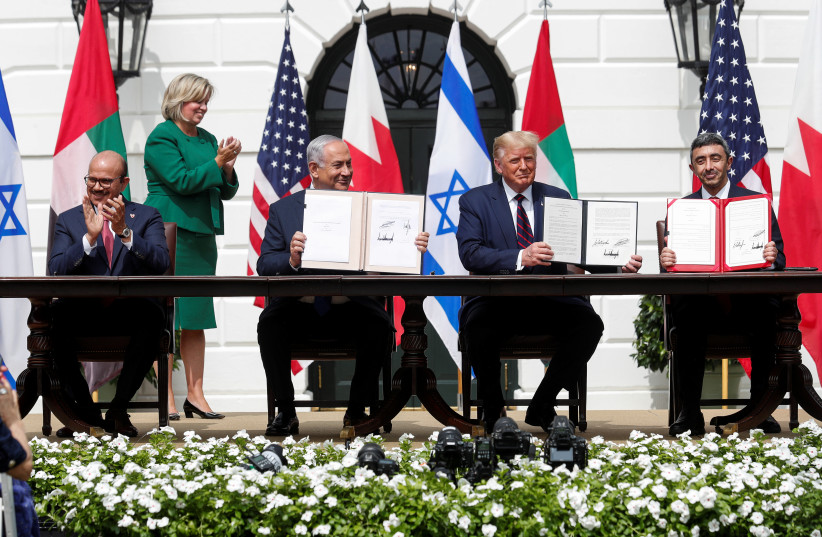Where Donald Trump and Benjamin Netanyahu charged ahead, so far, Joe Biden and Naftali Bennett have just been marking time.
MARK REGEV
OCTOBER 21, 2021 20:44

A week ago, US Secretary of State Antony Blinken hosted the foreign ministers of Israel and the UAE, Yair Lapid and Abdullah Bin Zayed Al Nahyan, at the State Department. Although Blinken announced that the intention was to “discuss accomplishments since the signing of the Abraham Accords,” the trilateral meeting exposed the current stagnation in Arab-Israel peacemaking. For if 2020 saw tremendous momentum in normalization, with Israel signing four new agreements with four Arab countries in just four months, energy has now seemingly run out on the further expansion of the circle of peace. Where Trump-Netanyahu charged ahead, so far, Biden-Bennett have just been marking time.
The Abraham Accords demonstrated that across the Arab world, there is a readiness for peace and normalization. Not confined to one specific geographic bloc, the accords involved two Arab League states in the Gulf (the UAE and Bahrain), one on the Atlantic shore (Morocco), and still another on the southernmost periphery of the Arab world (Sudan). Notwithstanding this week’s report on the so far inconclusive normalization talks between Israel and the Comoros in the Indian Ocean, further significant Abraham Accords breakthroughs now appear to be on hold.
At the same time, the Bennett-Lapid government has had a series of successes in navigating Israel’s ties with three key Arab neighbors, Egypt, Jordan and the Palestinian Authority.
Bennett’s meeting in Sharm e-Sheikh with Egyptian President Sisi in mid-September was the first such public summit in a decade. Bennett said that he and Sisi agreed that the relations between Israel and Egypt are “a cornerstone in Middle East security and stability,” adding his appreciation for the “significant role” Egypt plays in “maintaining security stability in the Gaza Strip.” Emblematic of the new spirit in the relationship is Egyptair’s recent decision to establish regular direct commercial flights between Tel Aviv and Cairo.
As for Israel’s ties with Jordan, it was reported that after years of their public acrimony, Bennett held a secret meeting with Jordan’s King Abdullah in Amman shortly after becoming prime minister. In parallel, Lapid met with his Jordanian counterpart, Ayman Safadi, at the Allenby Bridge. Although there were concerns that the leaking of the Bennett-Abdullah meeting to the Israeli media could undermine the newfound dialogue, the decisions to transfer millions of cubic meters of water from the Sea of Galilee to Jordan and to facilitate Jordanian exports to the Palestinian Authority are tangibles that are undoubtedly much appreciated by the Jordanians.

Concerns remain that despite the supposed normalized relations, the Jordanians – unlike the Egyptians – still insist that high-level summit meetings take place in secret. Nevertheless, the gift King Abdullah sent to the prime minister’s wife, Gilat, was undoubtedly an indication of Israeli-Jordanian thaw.
Even on the Palestinian track, despite Bennett’s refusal to meet with PA President Mahmoud Abbas or to reengage in peace talks, and the prime minister’s public condemnation of the PA for pursuing the prosecution of Israelis at the International Criminal Court and for the financial incentives the PA provides to terrorists who attack and murder Israelis (“pay for slay”), there has still been a modest improvement in the tone.
When Defense Minister Benny Gantz met Abbas in Ramallah at the end of August, it was the first face-to-face session between a senior member of Israel’s cabinet and the Palestinian president in over seven years.
Since then, a series of practical steps have been taken to improve the day-to-day realities for Palestinians in the West Bank, including granting residency permits to 4,000 undocumented family members of Palestinians; approving construction of 1,000 new housing units for Palestinians in Area C; lending the PA $155 million to help it weather the current financial crisis; and increasing by 15,000 the number of Palestinian laborers allowed to work in Israel.
The Bennett-Lapid government has also been successful in building upon the Abraham Accords relationships established on Netanyahu’s watch. Lapid conducted fruitful visits to the UAE, and more recently, to Bahrain. He met with senior leadership in both, signed multiple bilateral agreements, and officially marked the new normalized relations by formally opening Israel’s new embassies. During his visit to Morocco in mid-August, Lapid inaugurated Israel’s diplomatic mission in Rabat, and reached understandings on the reciprocal opening of embassies. Especially in the Gulf, Israel’s new ties go from strength to strength, with Bennett soon expected to be the first Israeli prime minister to visit the UAE.
But even with this important progress, the glass remains only half full. It will be remembered that as 2021 dawned, the conversation among those “in the know” focused upon which country would be next to join the Abraham Accords bandwagon, and how quickly. Would it be Oman, Qatar, or maybe even the big prize – Saudi Arabia? Could there be a shift toward Israel among the Arab states of North Africa? And what of the Muslim giants of Asia and Africa? Today, there is no such upbeat discussion; hopes now seemingly dashed for any expeditious expansion of the circle of peace.
Here the finger should be pointed at Washington. Despite last week’s public reiteration by the secretary of state of American support for the Abraham Accords, the Biden team has so far done little to prioritize additional Arab-Israeli normalization. This may be about the new administration’s reallocation of America’s foreign policy preferences, but could also stem, at least in part, from ideological considerations. Officials who believe in the centrality of the Palestinian issue could perhaps think that normalization needs to be put on hold as a reward for Israel to incentivize a future two-state solution.
Such an approach can only empower Palestinian intransigence by returning the PA’s veto on all new regional peacemaking. This will be detrimental to Israeli-Arab normalization and ultimately also to Israeli-Palestinian peace, making them both more difficult to achieve. The end result is the indefinite postponement of any significant expansion of the Abraham Accords to include additional Arab and Muslim countries. Does Joe Biden really want such stagnation as his legacy?
The writer is a former senior adviser to the prime minister and currently a senior visiting fellow at the INSS. Follow him at @MarkRegev on Twitter.
Content retrieved from: https://www.jpost.com/opinion/abraham-accords-is-the-israel-arab-circle-of-peace-expansion-over-opinion-682776.